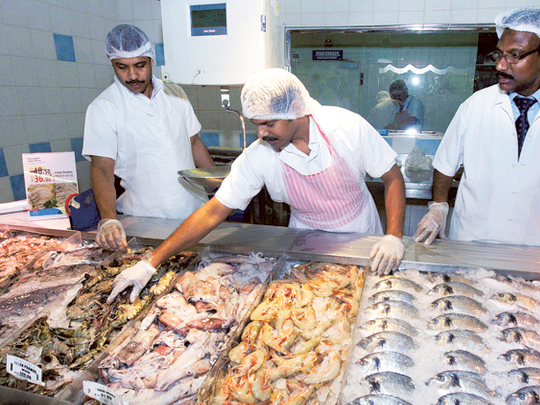
Abu Dhabi: The Abu Dhabi government’s plan to encourage the setting up of aquaculture farms will ensure an abundant supply of five species of fish that are most in demand in the UAE.
Hammour (orange-spotted grouper), Cobia, goldlined seabream (Qabit), Yellow Fin Tuna and Abalone are in high demand in the market but their stocks have been dwindling due to overfishing.
These five species have been identified for farmers in the initial stage of the aquaculture development plan being formulated by the Environment Agency-Abu Dhabi (EAD) in collaboration with other government bodies, farmers, non-government organisations (NGOs) and researchers.
Aquaculture is the practice of using controlled environments to promote the growth of aquatic animals and plants for food, the aquarium trade, restocking or commercial purposes, and currently contributes over 50 per cent of the world’s fish supply for human consumption, making it an important contributor to the world’s food supply chain.
Global aquaculture output will contribute more than 62 per cent of the global seafood supply by 2020, according to the Food and Agriculture Organisation (FAO) of the UN.
Abu Dhabi’s aquaculture sector is in its infancy but there is increasing interest in aquaculture within the emirate and it has been identified as a priority sector for development by the Government of Abu Dhabi, an official spokesperson of the EAD told Gulf News on Thursday while elaborating on the plan.
The initial five species to be replenished were selected after reviewing over 25 candidate species, and studying market and production conditions, besides socio-political, environmental, and economic factors.
Hammour, Qabit and Cobia are the local sea fish that are the most overexploited. Yellow Fin Tuna and Abalone are non-native and will only be considered for on-land (indoor) recirculating aquaculture systems.
Asked about the feasibility of the plan, the spokesperson said: “We as government entities are putting the right enablers in place to encourage sustainable aquaculture. Sustainable in the sense of, it must be cost-effective and profitable for the producer, and it must be environmentally and socially sustainable.”
“However, at the end of the day, it is a business like any other, and how cost-effective it is depends on how well it is operated and managed. But yes, it does have the potential to be a profitable business due to the high demand for seafood by the Emirati and Asian communities in the UAE, who consume fish and seafood at least a few times a week,” she said.
Regarding existing aquaculture projects in the emirate, she said there are several success stories such as the state-of-the-art sturgeon and caviar production by Emirates Aqua Technologies at their facility in Abu Dhabi and Al Jaraf Fisheries shrimp farm on Barmid Island. The most commonly cultured fish, however, is tilapia (bulti), cultured in simple yet extensive systems thanks to their high tolerance to stress and the ease with which they can be bred.
The development of sustainable aquaculture in the emirate will help alleviate pressure on declining wild fish stocks, balance of trade and food security, economic development, employment, and the preservation of precious groundwater resources.
“We are discussing all the different and necessary aspects such as policy and regulation, permitting, monitoring and enforcement and, very importantly, development,” she said.
Farmers should have a reliable local source of fingerlings, quality feed, and technical know-how (by attending demonstration farms, for instance) to help them improve their efficiency and be more profitable and environmentally sustainable.
“As a government, we are collectively discussing our roles in this regard, which we will communicate when the time is right. The EAD will not necessarily be undertaking this role, but working with the relevant entities such as the Ministry of Environment and Water, Marine Research Centre, Abu Dhabi Farmers Services Centre, the UAE University Aquaculture Research Department and so on to realise this objective,” the spokesperson said.












